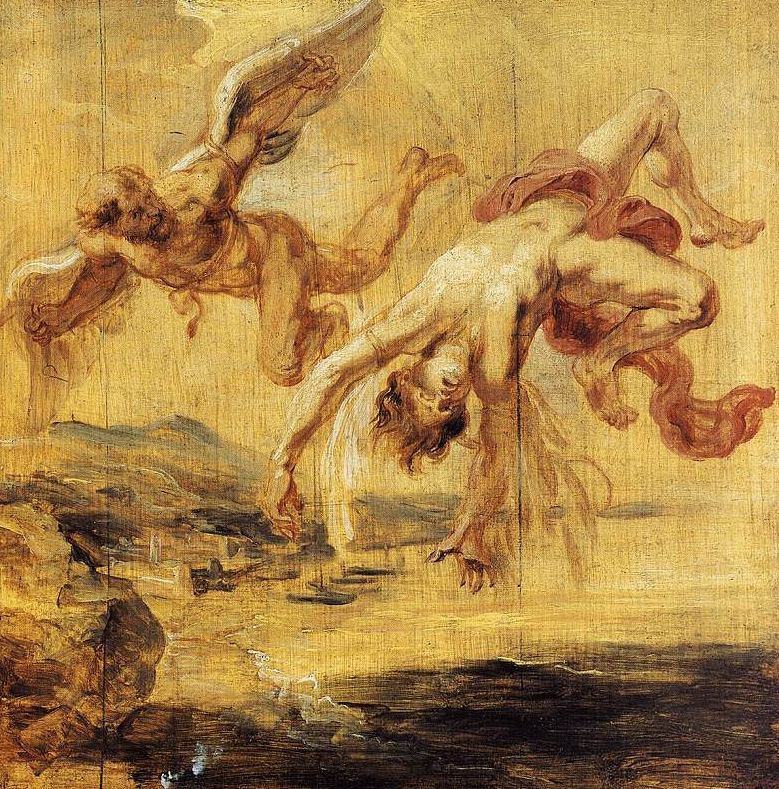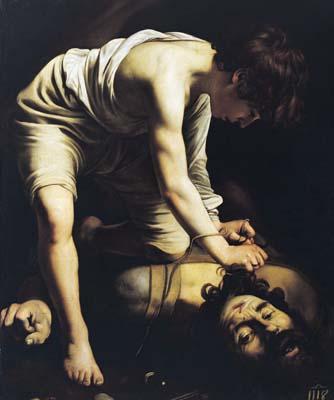Stories about Technology
![]()
Thamus | Wizard of Oz | Daedalus | David & Goliath | Prometheus | Faust | Frankenstein | E. M. Forster
Thamus, King of Egypt whose warning to his inventor Thoth (Hermes or Mercury)–that written language would replace real memory with mere recall–went unheeded. The King wisely pointed out that the appearance of being smart would substitute for genuine intelligence because with the introduction of written language there occurs an eclipse of wisdom. The wisdom inherent in the accurate recall based on an exercise of memory in the oral tradition is lost when writing is widely practiced.
Plato's Phaedrus recounts the story.
See the primary document: Phaedrus on line.
![]()
Thamus | Wizard of Oz | Daedalus | David & Goliath | Prometheus | Faust | Frankenstein | E. M. Forster
 Daedalus, the "artful builder" of the Labyrinth.
His son Icarus dies in an accident when they escaped from the edifice, yet mistook their way. Both used Daedalus' design for wings of wax, wood and feathers after they failed to get out of the maze on foot. Daedalus the concerned father warns Icarus to be careful as both flew with handmade wings to escape the monster imprisoned in the labyrinth. Having advised Icarus that his wax constructed
wings would melt if he flew too near the sun, Daedalus watched in horror as
the youthful Icarus–drawn by the power of his invention and the agility of his flight–soars ever more near to the sun. By flying too close to the sun, Icarus plunged to the earth, after the wax melted and the wood burned from the
sun's intense heat.
Daedalus, the "artful builder" of the Labyrinth.
His son Icarus dies in an accident when they escaped from the edifice, yet mistook their way. Both used Daedalus' design for wings of wax, wood and feathers after they failed to get out of the maze on foot. Daedalus the concerned father warns Icarus to be careful as both flew with handmade wings to escape the monster imprisoned in the labyrinth. Having advised Icarus that his wax constructed
wings would melt if he flew too near the sun, Daedalus watched in horror as
the youthful Icarus–drawn by the power of his invention and the agility of his flight–soars ever more near to the sun. By flying too close to the sun, Icarus plunged to the earth, after the wax melted and the wood burned from the
sun's intense heat.
While Daedalus represents the inventive ability of human ingenuity, Icarus symbolizes the consequences of misunderstanding the materials we use to reach out lofty goals. Here too, in this story, is a parable of human desire. We may need courage to break the bonds of our self-imposed isolation; but often we will crash and burn if we dare become too close to those whose interests do not coincide with our virtuosity.
![]()
Thamus | Wizard of Oz | Daedalus | David & Goliath | Prometheus | Faust | Frankenstein | E. M. Forster
Prometheus, a Titan who so loved humans that he was punished for defying the will of the gods when giving fire to humanity. In this act of treachery and betrayal of the Olympian deities, he thereby created a tradition of heroic action with respect to power and craft. His actions embody the myth of overcoming insurmountable odds in the dedication to earthly, mortal, or base things. Prometheus breaks the separation between the immortal and transformational power of fire and the mortal and static world of human beings. He is Aeschylus' hero whose devotion to imperfect people encourages him to give us divine fire. As a consequence of his hubris in defying the divine order, he is punished for eternity by having a raptor eat out his liver while he is chained to a rock in the Caucasus Mountains or the Aegean Sea depending on the version of the story.
Prometheus symbolizes the conquest of the old order as people seized powers from nature, once dormant, and made them serviceable to human ends.
![]()
Thamus | Wizard of Oz | Daedalus | David & Goliath | Prometheus | Faust | Frankenstein | E. M. Forster
 David and Goliath. These two heroes fight one another to an unexpected finish.
David, small and ill equipped with only with a sling confronts the giant Goliath ensconced in heavy armor
with a huge, and powerful sword to always retain the advantage. Yet against all odds, David using wit and skill (ingenuity) wins, defeats, and beheads the fearsome giant with divine guidance, thereby saving the Israelites from destruction at the hands of their rivals the Canaanite camp.
David and Goliath. These two heroes fight one another to an unexpected finish.
David, small and ill equipped with only with a sling confronts the giant Goliath ensconced in heavy armor
with a huge, and powerful sword to always retain the advantage. Yet against all odds, David using wit and skill (ingenuity) wins, defeats, and beheads the fearsome giant with divine guidance, thereby saving the Israelites from destruction at the hands of their rivals the Canaanite camp.
Goliath the older, sophisticated urban giant is decapitated by the guile and cunning of the handsome young David, a pastoral shepard. Why? Well, because defense is less of a risk to implement than offense or that security and strength breeds overconfidence while the underdog is forced to use his intelligence.
Their story represents the offensive strategy and tactics in warfare symbolized so well by the size, power and advantage of Goliath and the defensive approach embodied in David's pebbles and sling. David represents the simple, yet artful capacity of the small scale to often overturn, if not wear down the force of large scale technological systems.
![]()
Thamus | Wizard of Oz | Daedalus | David & Goliath | Prometheus | Faust | Frankenstein | E. M. Forster
Faust, made a bargain with the devil for his soul in exchange for the power of knowledge over the material forces of the Earth. His triumph of the will to transform the earth to serve men's desire's and needs ends with his inability to win the love of his beloved. This is a powerful Germanic and Anglo-Saxon myth of the single-minded acquisition of knowledge --especially the discovery and mastery of things not meant for human understanding.
In many ways this is a riff, or a further articulation of the theme of divine transgression found in Prometheus bound to the rock for eternity, but with a twist. Here the culprit is the ego seeking to know the hidden, esoteric arts so as to control the awful and frequently harmful forces of nature that cause human misery and suffering. Faust the medieval magus (magician from Magi) desires, if not lusts after the power to control floods, fires, famines and frosts thus representing the modern willingness to give up spiritual solace and character born of withstanding hardships, for conquest of pain and suffering. His will to power is such that Faust trades his divinity for the capacity to dominate, acquire, and redesign materials and nature's inherent forces.
![]()
Thamus | Wizard of Oz | Daedalus | David & Goliath | Prometheus | Faust | Frankenstein | E. M. Forster
Frankenstein, the new Prometheus, Mary Shelley's (1797-1851) modern allegory.
"...yet still the words of the fiend rung in my ears like a death-knell, they appeared like a dream, yet distinct and oppressive as reality"
(Victor Frankenstein in Frankenstein, or the Modern Prometheus).
This story is a commentary about the necessity of moral rectitude in the use of experimental power. The creature is constructed from the body parts of deceased people and brought to life by a genius, who in breathing life into the remnants of the dead mimics the power of creation. By brining a beautiful life into the world the noble Doctor is unable to give the creature the love and guidance it needs to become fully human and cope with his congenital flaw–the creature is prone to decay. Thus does an ignoble end, the struggle of the creature to understand what it is becoming, arise out of noble aspirations.
Shelley wants to tell us a story of parental responsibility fashioned around a tale of suspense and inquiry represented by the scientist's need to know and in knowing transform what exists. She was the daughter of William Godwin –who believed in the perfectibility of humankind– and Mary Wollstonecraft –who wrote the cogent plea for women's equality in the 18th century.
Often, we all do powerfully material things frequently without understanding the emotional component or wider consequences of the activity. This is analogous to a gifted researcher (represented by Dr. Victor Frankenstein) systematically knowing the details (electricity, body parts, anatomy, etc.) but misunderstanding the broader implications of their experimental outcome (the creature, fiend, or monster).
Attribution is that the book, Frankenstein, 1818, was the outgrowth of story telling one evening in Switzerland when Mary Shelley, her husband (they eloped in the summer of 1814 to France) the poet Percy B. Shelley, and their friends–among whom was Lord Byron–told each other diabolically entertaining stories. Mary Shelley lost three of her four children in either childbirth of infancy. So the theme of familial duty is a reasonable reading of the Frankenstein story, despite the fact that in Hollywood during the 20th century, the tale took on a sinister mask of horror.
![]()
Thamus | Wizard of Oz | Daedalus | David & Goliath | Prometheus | Faust | E. M. Forster
![]()
John Henry, "a steel drivin' man," hero of the song who dies working laying miles of railroad track to the rhythm of the machine.
Jack Gladney, who recognizes the toxicity of our passion for drugs, violence, pollution and pretentious living without intensely moral emotional commitment largely motivated by our morbid fear of death and pain. Hero of Don DeLillo's White Noise.
![]()
Thamus | Wizard of Oz | Daedalus | David & Goliath | Prometheus | Faust | Frankenstein | E. M. Forster
![]()
E. M. Forster, "When the Machine Stops" a post modern allegory about technology's power to generate our most vivid experiences leads to an addictive dependency on a surrogate reality where ersatz material conditions replace the actual sensory world of nature and agriculture. A distopian short story written in conscious rejection of the Verne and Wells utopian novels.
![]()
The Wizard of Oz depicts American views of technology, agriculture and power at the turn of the twentieth century (1899-1900). The scarecrow represents agriculture, the tin man represents industry and Dorothy is symbolic of youthful or naive America searching for a way to get back home. It is unclear what home represents, but the lion represents the need for a new soul, lost in the pursuit of money. That displacement of traditional morals by commercial values deepens the importance of the assault of progressive and modern ways of living and thinking on 19th century American values. The wizard represents expertise and the authority of technocracy that is all show and little or no substance.
![]()
Thamus | Wizard of Oz | Daedalus | David & Goliath | Prometheus | Faust | Frankenstein | E. M. Forster
Lesson:
"To every gain there is a commensurate loss; you can't get something for nothing."
Just because you do not see the hidden costs, does not mean you are not paying for those costs that accompany technologcal change.
Technology cannot substitute for something that requires human judgment.
![]()
Thamus | Wizard of Oz | Daedalus | David & Goliath | Prometheus | Faust | Frankenstein | E. M. Forster